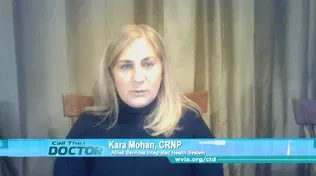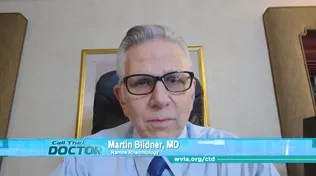Call The Doctor
Living with Autoimmune Disease
Season 33 Episode 12 | 25m 12sVideo has Closed Captions
Researchers suspect genetics could play a part in causing autoimmune disorders.
An autoimmune disease is a condition in which a person’s immune system attacks healthy cells in their body. Doctors still don’t know what causes most autoimmune diseases or why some people are more likely to get them than others. A recent study shows women are more likely to get an autoimmune disease than men, and researchers suspect genetics could play a part in causing autoimmune disorders.
Problems with Closed Captions? Closed Captioning Feedback
Problems with Closed Captions? Closed Captioning Feedback
Call The Doctor is a local public television program presented by WVIA
Call The Doctor
Living with Autoimmune Disease
Season 33 Episode 12 | 25m 12sVideo has Closed Captions
An autoimmune disease is a condition in which a person’s immune system attacks healthy cells in their body. Doctors still don’t know what causes most autoimmune diseases or why some people are more likely to get them than others. A recent study shows women are more likely to get an autoimmune disease than men, and researchers suspect genetics could play a part in causing autoimmune disorders.
Problems with Closed Captions? Closed Captioning Feedback
How to Watch Call The Doctor
Call The Doctor is available to stream on pbs.org and the free PBS App, available on iPhone, Apple TV, Android TV, Android smartphones, Amazon Fire TV, Amazon Fire Tablet, Roku, Samsung Smart TV, and Vizio.
Providing Support for PBS.org
Learn Moreabout PBS online sponsorship- Living with autoimmune disease.
coming up next on, Call The Doctor.
(upbeat music playing) - [Speaker 1] The region's premier, medical information program, Call The Doctor.
(upbeat music playing) - [Paola] An autoimmune disease is a condition in which a person's immune system attacks healthy cells in their body.
Doctors still don't know what causes most autoimmune diseases or why some people are more likely than others to get it.
A recent study shows women are more likely than men to get an autoimmune disease and certain ethnic groups, including African Americans and Hispanic people, are more susceptible to conditions like lupus.
Researchers suspect genetics could play a part in causing autoimmune disorders.
Type 1 Diabetes, Rheumatoid Arthritis, Multiple Sclerosis and Psoriasis are some of the more common autoimmune diseases.
Symptoms can include fatigue, muscle aches, and red and swollen joints.
Typically medications to reduce inflammation and calm the immune response are used to treat an autoimmune disorder.
Living with autoimmune disease now on, Call The Doctor.
Welcome to, Call The Doctor here on WVIA.
I'm Paola Giangiacomo, and tonight our topic is autoimmune diseases.
Joining us on the panel, Dr. David Pugliese, he is a board-certified and fellowship-trained rheumatologist with Geisinger.
Kara Mohan, is a certified Nurse Practitioner with Allied Health, and Dr. Martin Blidner, he is a rheumatologist with Ramos Rheumatology.
I would like to remind our viewers that you can participate in the conversation at wvia.org/ctd You can also submit your questions for future shows by emailing ctd@wvia.org or using the #wviactd And be sure to check our website for a listing of future programs and watch Call the Doctor, episodes anytime on the WVIA app.
Now we'll begin our discussion.
Thank you all for joining us to discuss autoimmune diseases.
Dr. Pugliese, I'll start with you.
What is an autoimmune disease?
- So autoimmune disease is essentially our immune system gets confused.
We use our immune system to help fight off bacteria, viruses, and along the way in people who have autoimmune disease, that response gets confused and starts targeting our own body.
and it can target any part of the body.
It could be joints, it could be skin, it could be internal organs, and when the immune system does that, people have a whole spectrum of illnesses that they can present with, and it's all related to their immune system doing what it thinks it's supposed to do, which is kill the foreigner.
But this case it's gotten confused, and it's attacking ourselves.
- Dr. Blidner, now there are 14 autoimmune diseases.
Are the symptoms all pretty similar, and how would one know that they might have an autoimmune disease?
- There are actually probably about 100 different autoimmune diseases, and sometimes the symptoms do overlap.
There are commonalities for example, joint pain and joint swelling is very common, but certain autoimmune diseases like idiopathic thrombocytopenic, where you have antibodies being made to your platelets and the major side effect may be bleeding, so they are quite varied.
It's very hard to say whether or not you have an autoimmune disease cause these symptoms can be so protean.
There are tip-offs for example, excessive fatigue, low grade fever, muscle aches, and then you start getting more specific changes like certain types of rashes or joint swelling or weakness.
These are all different symptoms that can occur with systemic diseases associated with autoimmune problems.
- Kara, rheumatoid arthritis is one of the common autoimmune diseases.
What types of symptoms would that patient be feeling if they were to have rheumatoid arthritis?
- So patients primarily with rheumatoid disorder will have primary inflammation, more tenderness.
Biggest thing where it comes in into my area, is their inability to ambulate or dismobility and increased weakness And therefore they tend to need more and more care within the home - And can medications Dr. Pugliese, help these patients?
- They can, so a lot of times when we think about arthritis, we think about wear and tear or things we've done to ourselves.
Rheumatoid, all the inflammatory arthritities, are a completely different animal.
They're driven by inflammation, and we can with the medicines we have nowadays, be able to control that inflammation.
And if we're able to do that, we're able to not only help people feel better, but we're also able to stop the progression and wear and tear is sort of it's there once you've done it you're stuck with it.
But if we're able to catch an autoimmune problem early and treat it and get it under control, we can stop the damage that comes from that autoimmune condition.
- Now are autoimmune diseases something you're born with or could you get it later in life, in your adult life, or how does that work, Dr. Blidner?
- Certainly there are autoimmune diseases that you can be born with, and most of those are immune-deficiency diseases, in which your immune system is not working properly and you're susceptible to infections.
Most of the autoimmune diseases that we think of occur later in life, and it can occur at any time.
We can see it in children like juvenile rheumatoid arthritis, or we can see it later on in life as any kind of inflammatory autoimmune problem from rheumatoid arthritis to lupus to dermatomyositis to scleroderma.
There is no age limit for autoimmune disease.
In fact as you get older your immune system does change and sometimes make you more susceptible to immunological problems.
- Mm-hmm.
You mentioned lupus, Dr. Blidner Isn't one of the medications for lupus, hydroxychloroquine the same medication that came to light and became controversial during the COVID pandemic.
- Yes.
It was very interesting for rheumatologists to hear this cause this is a drug that we've used our entire careers.
It's been around for a long time.
And many if not most lupus patients at some time if not indefinitely are on plaquenil we even use it during pregnancy and plaquenil is the name brand for hydroxychloroquine.
There was some interest initially with treating COVID with that but then there were a number of studies done and a number of population studies looking at the large registries in Europe and the rheumatology literature feels that hydroxychloroquine is not effective treatment for COVID.
And in fact the whole issue probably cause more harm than good in preventing lupus patients from getting the drugs that they needed at the time.
Fortunately that has eased up quite a bit.
- Okay.
Why were lupus patients prevented from getting their medication?
- It turns out that the government was stockpiling hydroxychloroquine and then people were trying to get hydroxychloroquine just in case they got COVID.
And as a result there was a depletion of the general supply of hydroxychloroquine for patients who really needed.
Patients like lupus patients and rheumatoid arthritis patients also use hydroxychloroquine.
- Interesting.
If there's a COVID patient who still thinks even after what you just said, still thinks that hydroxy chloroquine would be a good remedy for COVID-19.
Can they demand that from you as a doctor, Dr. Pugliese?
- They can ask but the reality is we're obligated to practice, by best practice standards and evidence-based medicine.
And as we gather evidence and we became confident that hydroxychloroquine was not gonna be an effective drug, the demand is not a rational one.
So we're obligated to say there's data, there's literature, the side effect profile of the drug although it's generally pretty good outweighs any benefit it might provide for somebody with COVID.
So just cause they want it we have to practice within the bounds of science and we would not offer it in that case.
- Okay.
If you're not born with an autoimmune disease Dr. Blidner, is there a way to prevent it maybe through diet?
- That's always an interesting question.
I always tell people they have to do what their grandmother told them.
They have to exercise, have to maintain a good weight.
They have to reduce the stress in their life.
They should limit the use of alcohol and generally take good care of themselves.
In terms of diet there is no specific diet, although we do feel that vitamin D may have some benefit for people with immunologic diseases and we would encourage people to make sure that their vitamin D levels are normal as part of their treatment.
- Vitamin D, that sounds good for all of us, some sunshine but we won't get that in Northeastern Pennsylvania this week.
Kara, in what ways would you treat a patient with an autoimmune disease where you are - Depending on what the disease is and in some people it's not always pain some people it's just management of other symptoms or keeping check on the disease, such as if they're a diabetic, what are we doing to educate as far as correct diet, maintaining adequate even flow blood sugars throughout the day.
If it's somebody with polymyositis are we doing physical therapy to optimize their muscles and decrease the likelihood of them having to depend on a wheelchair routinely And if it's somebody with MS are we utilizing physical therapy and other avenues that we have in the community to maintain their strength and independence for as long as possible.
- Can an autoimmune disease become fatal, Dr. Pugliese?
- Yeah.
There's a misconception especially with things like rheumatoid arthritis that they're actually just arthritities.
The immune system's everywhere.
So anybody with an autoimmune disease has the potential for that disease to attack their organs.
And we very frequently will see patients with any number of our autoimmune diseases, in the ICUs in critical condition they can have attacks on their blood vessels attacks on their hearts, attacks on their lungs.
And so even people who have something they associate with just arthritis and pain, people can get rheumatoid lung they can get rheumatoid heart, they can get very bad lupus in their kidneys and their lungs.
So any of these diseases if they're not managed and observed properly can wind up with very serious consequences.
- What about the Western diet?
Does that have any effect on triggering an autoimmune disease, Dr. Blidner?
- The diet itself is important in terms of weight control.
So obese people we certainly know from COVID don't do as well.
And so maintaining a healthy diet is important without a lot of unnatural things in the diet.
And certainly fat diets for the most part are not particularly encouraged.
The Mediterranean diets tend to be a healthy diet and one that we would encourage.
There is nothing that I can think of off the top of my head that would say there's a particular food that's particularly bad for you.
In general a good diet, a healthy diet is good for your immune system.
- And if you contract COVID and you have an autoimmune disease is that considered an underlying condition that could worsen the virus and its effects?
- Yeah - Yeah.
certainly.
Go ahead, Dave.
- It's really interesting.
There's a lot of ways that autoimmune disease interacts with this pandemic.
On the one hand, yes, it's an underlying condition.
These patients are prone to flare their autoimmune disease whenever they get sick, especially if they get sick with something as bad as COVID.
But the other side of the coin is we treat them by making their immune systems weaker.
So part of what we do to help their autoimmune disease may in fact be a challenge to a pandemic like this.
And then the third side of the coin is part of what makes COVID so bad is people have these terrible immune reactions.
So in some cases they've tested using immune suppressing drugs.
So as you can tell it gets very confusing.
What's the right way to go?
How much immune suppression?
How much do we try to control inflammation?
And how much do we not make them vulnerable?
- So if you have an autoimmune disease, does it make sense to strengthen your immune system any way possible?
- That can be a challenge.
So if you have an autoimmune disease and you do something to boost your immune system, there are some studies that show some of those efforts can actually result in flares of your autoimmune disease.
Having an autoimmune disease doesn't necessarily mean your immune system's too weak.
It just means it's doing the wrong thing.
And so we have to be very careful, there's studies about things like echinacea when people try to boost their immune system that we've seen that that makes lupus flare.
So we have to be careful about how much do we encourage boosting the immune system versus healthy lifestyle and appropriate medication balance.
- Because all you hear nowadays is about boosting your immune system.
But if you have an autoimmune disorder that may not be such a good idea, - [Pugliese] Yeah, correct.
- You mentioned flare-ups Dr. Blidner, what would cause flare-ups and how can patients keep those at bay?
- Anything that could kind of get you out of sorts It could be an infection It could be a hormonal change, It could be stress, It could be even trauma.
Any of those things can flare you.
Many times we don't know what's causing the flare.
What we know is that all of a sudden people start getting worse.
Sometimes it's a reaction to the medication or the medication is not working well.
Those are all things that can potentially make you flare-up.
But these diseases by their nature tend to wax and wane.
The immune system is a very complex interaction of the different substances in the body that's controlling infection.
And so sometimes one goes up while the other goes down, et cetera.
And all those different effects can lead to imbalance with your immune system resulting in a flare.
- What if you have celiac disease wouldn't eating gluten affect or cause a flare-up, Dr. Pugliese?
- Yeah, basically with celiac disease the challenge to your immune system comes from your gut and from the allergy and basically that you're putting in with gluten.
That's something in that case that that immune system is attuned to gluten and gluten is a challenge.
So when they eat that their immune system mistakes it for something they shouldn't have and revs up and they get this flare-ups.
That's a case where there's a specific dietary cause for an immunologic response.
- Doesn't everything emanate from the gut?
Like if you have a healthy gut bacteria then that could help you especially if you have celiac disease or?
- There's a lot of theory about that it's called the microbiome, the idea that the right constitution of bacteria that's in our system can be protective or damaging.
I think there's a lot of decent science behind it but I don't think there's a whole lot of definitive proof for just where that microbiome sits in the whole cascade of events.
So I think there's definitely a lot of theory a lot of science and we just haven't quite nailed down for sure the truth of the microbiome and autoimmunity.
- Speaking of celiac disease, you hear so much about gluten intolerance.
If you have a gluten allergy does that mean you have celiac disease, Dr. Blidner?
- That's very difficult to say because gluten allergy kind of implies the fact that you have a reaction to gluten but we can see patients all the time that we do antibodies for gluten or for gliadin which is the protein involved, and they may have an antibody to it and never have any symptoms.
So again there's this complex interaction between antibodies and antigens within the gut and the microbiome is actually part of it.
There's certainly certain types of microbiomes that you see with certain autoimmune diseases like crohn's disease.
The problem is we have no way of really changing the microbiome.
And we're still a ways away from making any kind of therapy that would affect the microbiome - And with so many symptoms being similar.
Is it difficult to diagnose an autoimmune disease?
And are there tests for diagnosis?
- Yeah.
That's one of the biggest challenges in rheumatology and I think anybody who does rheumatology for a living has to like complicated puzzles and problems.
We have tests.
The tests are not perfect.
We have lots of false positives and lots of false negatives.
So we can't rely on our tests like we might say for a cholesterol test here's your number, here's what it is.
Treat it and get better.
For us it's a complicated interaction of what's your story?
Does your story tell us inflammation?
Do those stories match with certain antibodies or inflammatory markers?
And because all autoimmune disease is driven by your immune system they all share a lot of common features.
And a lot of times it takes a long time to nail down a definitive name just because they share so many features.
And we wind up saying, this is autoimmune we know it, you got the right set of symptoms from bright labs, but we just can't say it's this definitive one because it's in that middle area where everything sort of looks the same.
- So then how do you treat that patient?
- We treat based on which of the symptoms they're manifesting, which of the categories of autoimmune disease we think they best fit in.
And then we match that with what are the things at least likely to cause them harm.
And we try to come up with that balance and we try to adjust their immune system.
So it doesn't do the things it's doing and watch where they go with what we're doing.
- And you mentioned inflammation, Dr. Blidner.
That's another word like gluten that you hear so much about, inflammation.
What's going on in the body in terms of the inflammation.
- What inflammation means is that there's something within the body that is not acting properly in a way that is causing damage.
And a lot of that is triggered through the immune system and if rheumatologists are very good at immunology but they are particularly good at inflammation because underlying all these problems is inflammation.
And that's where the immunological issues come into play and causing damage.
They cause inflammation of the tissues.
And we all know what inflammation is.
We know what hot red, swollen joints are.
We know what rashes look like.
We know what a red eye looks like.
These are all examples of inflammation and what the immune system does in these autoimmune diseases is as a result of the immune system being overactive it creates an inflammatory problem when there shouldn't be one and that inflammation as well is causing damage for example, in rheumatoid arthritis the joint becomes inflamed, becomes hot red, it starts chewing up the bone and the cartilage resulting in deformity and permanent damage.
And that's a classic way that rheumatologists look at.
We often, for example, in arthritis, we look at whether this is a mechanical wear and tear type of problem or it's an inflammatory type of problem.
And just like what Dr. Pugliese, was saying, this is where the art of medicine comes in.
I think rheumatologists practice the art of medicine so much because it's a very complex issue.
And there are so many overlapping things.
I always feel that in the exam room, which is so important for rheumatologists, by taking a good history and doing a good physical we're well on our way to making a diagnosis.
And lots of times the laboratory helps us but only guides us.
It doesn't tell us what's going on.
- Right.
And that's where your expertise comes in to help guide the patient the best way to be treated - And experience.
- Right.
And what about staying active?
How does one with rheumatoid arthritis or chronic fatigue syndrome, how does one stay active and upbeat when they're tackling these issues, Kara?
- Staying active is focusing on the times when you have your greatest amount of energy during the day, doing your activity at that time, as far as with the physical part of your day.
Being upbeat as far as mentally is very challenging especially now with this pandemic you're socially isolated, and you just don't have the outlets that you had otherwise also with it being winter, people who were otherwise good walkers to some degree, don't have that avenue available to them.
So it's very difficult considering everything that we're dealing with right now for people to maintain a healthy outlook.
It's trying, to say the least.
- Definitely trying times.
This was all very interesting.
Thank you so much for joining us to discuss autoimmune diseases.
Once again I'd like to thank our panelists for participating in our discussion.
For more information on autoimmune diseases and resources check out wvia.org/ctd I'm Paola Giangiacomo, for Call The Doctor.
Thank you for watching.
(upbeat music playing)
Video has Closed Captions
Clip: S33 Ep12 | 45s | David Pugliese, DO - Geisinger (45s)
Video has Closed Captions
Clip: S33 Ep12 | 30s | Kara Mohan, CRNP - Allied Services (30s)
Living with Autoimmune Disease - Preview
Preview: S33 Ep12 | 30s | Watch Wednesday, March 10th at 7:30pm on WVIA TV (30s)
Video has Closed Captions
Clip: S33 Ep12 | 51s | Martin Blidner, MD -- Ramos Rheumatology (51s)
Providing Support for PBS.org
Learn Moreabout PBS online sponsorshipSupport for PBS provided by:
Call The Doctor is a local public television program presented by WVIA















